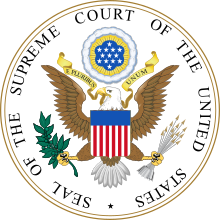User:Bobob695/sandbox

Mullenix v. Luna 577 U.S. ___(2015)
[edit]Mr. Leija, had a warrant for his arrest. He evaded arrest. resulting in a high-speed chase between himself and officers Randy Baker, Gabriel Rodriguez, and Chardine Mullenix. as a result a spike strip was set and offices Mullenix fired four rounds into Mr. Leija effectively killing him. In a 0-1 rule the Supreme court ruled that Trooper Mullenix had not violated Mr. Leija's fourth amendment. The court had also ruled that Trooper Mullenix had immunity for this incident because he had been withing the fourth amendment (see:Fourth Amendment to the United States Constitution).
History:
[edit]Scott v Harris- In this case an officer of the law, Deputy Timothy Scott, was in a high speed car chase and terminated it by pushing the bumper of Mr. Harris's car and he lost control of his vehicle and crashed and ended up, because of the accident becoming quadriplegic.[1] Deputy Scott was charged that he had violated Mr. Harris's fourth amendment rights by using extreme force against him.[2] The Supreme Court ruled in a 8-1 vote that Deputy Scott did his job and the actions that he had took to end the car chase was in the rights of the fourth amendment.[3] (see: Scott v. Harris)
Pearson v. Callahan- In this court case The Central Utah Narcotics Task Force had searched the house of Afton Callahan without a warrant because he had previously sold to an police informant Brian Bartholomew.[4] Bartholomew had set up a buy of methamphetamine, on gram for 100 bucks, and the met with the task force that was ready to go and make the arrest. the task force had given Bartholomew a marked 100 dollar bill and a concealed transmitter so that the police can listen into the conversation between the two men while the sale was going down.[5] The officers then drove Bartholomew to the trailer park were the buy would be happening. During the buy the informant gave the arrest signal to move in. They went into the house and arrested Mr.Callahan without a search warrant and took the drugs they had found in the trailer.[6]Tthe police force was charged that they had violated Mr.Callahan's fourth amendment rights. he Supreme Court had ruled in a 9-0 vote that the task force had done their job properly and stayed withing the rights of the fourth amendment.[7] (see: Pearson v. Callahan)
Brosseau v. Haugen- An officer of the Puyallup police force in the State of Washington, officer Rochelle Brosseau, had shot Kenneth Haugen in the back while he was fleeing from law enforcement.[8] it was claimed that she had uses excessive force and that had violated his federal constitutional rights. Before this incident a former associate of Mr. Haugen had reported to Officer Borsseau that he had stolen some tools.[9] She had also learned that there was a felony no bail warrant out for his arrest and that he had recently gotten into a fight. In an 8-1 decision the Supreme Court had ruled that Officer Brosseau had immunity for what had happened and that no constitutional rights were violated[10] (see:2004 term per curiam opinions of the Supreme Court of the United States)
Facts:
[edit]On March 23rd 2010, Sgt. Randy Baker of the Tulia, Texas police followed Israel Leija Jr. to a local Drive through. [11] Sgt. Baker had a warrant for the arrest of Mr. Leija and when he went to serve that warrant Mr. Leija, who then sped away from Sgt. Baker which then lend them on a chase. The chase was then joined by Trooper Gabriel Rodriguez to the Texas department of Public Safety. [12] During the chase a third officer joined, Trooper Chadrin Mullenix, who set up spike strips to stop the speeding car. Mullenix then took a shooting position then he fired six shots at Mr. Leija.[13] It was determined that Mr Leija was killed by the shots fired by Trooper Mullenix, who hit him four times in the upper chest. He was then sued under the fourth amendment. The Supreme Court ruled 0-1 in favor of Trooper Mullenix that he held immunity for his actions.[14]
Importance:
[edit]This case gave more security to police officers, allowing the to do there job and make the calls needed during high stress situation. This case has also been able to tell cops what they can do in case of an emergency and that they have protection in case they have to take a drastic action like having to use their service weapon. By protecting the rights that the cops have when they do their job they do not have to worry if they have to use deadly force on a person they can be protected if they are in the right when they are in the field.
 | This is a user sandbox of Bobob695. A user sandbox is a subpage of the user's user page. It serves as a testing spot and page development space for the user and is not an encyclopedia article. |
References
[edit]- ^ "Home - Supreme Court of the United States". www.supremecourt.gov. Retrieved 2015-12-13.
- ^ "Home - Supreme Court of the United States". www.supremecourt.gov. Retrieved 2015-12-13.
- ^ https://www.oyez.org/cases/2006/05-1631. Retrieved 2015-12-13.
{{cite web}}: Missing or empty|title=(help) - ^ https://scholar.google.com/scholar_case?case=14469071654478056574&hl=en&as_sdt=6,33&as_vis=1
- ^ https://scholar.google.com/scholar_case?case=14469071654478056574&hl=en&as_sdt=6,33&as_vis=1
- ^ https://scholar.google.com/scholar_case?case=14469071654478056574&hl=en&as_sdt=6,33&as_vis=1
- ^ https://www.oyez.org/cases/2008/07-751
- ^ https://scholar.google.com/scholar_case?case=16570362083305858647&hl=en&as_sdt=6&as_vis=1&oi=scholarr
- ^ https://scholar.google.com/scholar_case?case=16570362083305858647&hl=en&as_sdt=6&as_vis=1&oi=scholarr
- ^ https://www.oyez.org/cases/2004/03-1261
- ^ "Google Scholar". scholar.google.com. Retrieved 2015-12-05.
- ^ "Google Scholar". scholar.google.com. Retrieved 2015-12-05.
- ^ "Google Scholar". scholar.google.com. Retrieved 2015-12-05.
- ^ https://www.oyez.org/cases/2015/14-1143
